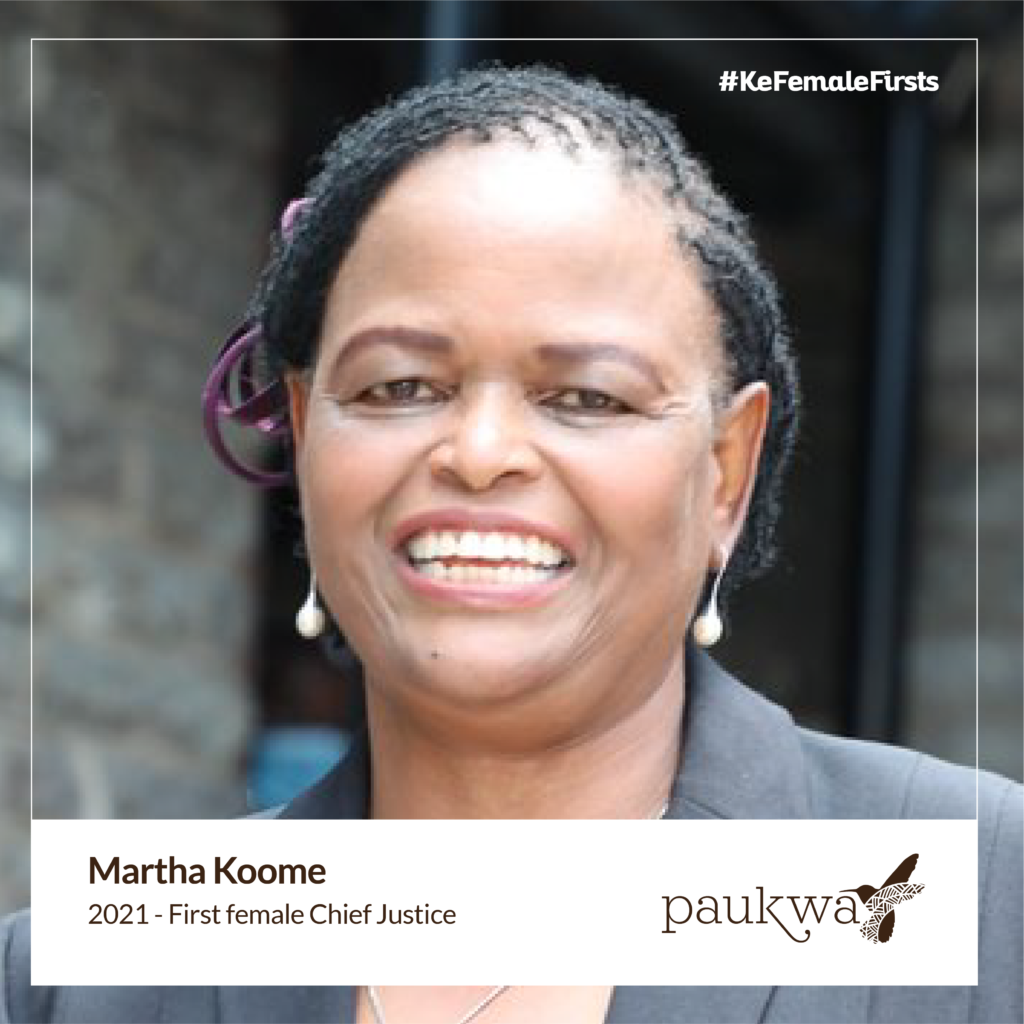Martha Koome: The Chief Justice
When Martha Koome was a small girl in Kithio village, fetching water and sweeping the dirt floor of her parents’ home, the thought that she would one day sit as the President of Kenya’s judiciary never crossed her mind. Born while Kenya was still a colony, the law was not the preserve of Africans, or women. But there was one thing that always propelled the young girl; it was the fuel that led her to unimaginable heights, that which prepared her for the heavy mantle she would one day wear. That fuel was the tenacity borne out of her mother’s wishes that she would one day gain an education.
Getting Through School
While Martha’s mother was illiterate, her deepest desire was to see her children go to school. School fees would be eked out of whatever could be harvested out of the small shamba which fed and supported nine children of which Martha was the last born. Growing up she had witnessed her sister reach untold heights when she became the first girl in the location to go to university. For Martha it was a signal that she too could achieve whatever she set her mind to.
The first hurdle was when she sat for CPE at the same time as her stepbrother. Although she passed well enough, her father decided to send her brother to school instead of her and encouraged her to repeat the year. It was her first real encounter with gender discrimination. Thankfully, her mother was of another mind.
With admission to Chuka Commercial Girls for secondary school – but no fees, it was off to the shamba to thrash as many beans as possible to raise the money needed. While at Chuka she learned both the standard subjects but also business English, shorthand and typing, an investment that would prove critical in later years when she had to pen down notes in court and run her own law practice. In 1980 she was admitted to Mugoiri Girls for her A Levels and left two years later as the top A Level student in her class. The success afforded her the opportunity to join East Africa Industries as an intern prior to joining University. This was her first foray into the formal world of work and the experience that brought her to the capital city.
School-Work-Life Balance
Prior to joining the University of Nairobi’s Law school, Martha got married and had her first child, meaning her life as a student was quite unique: lectures and lessons throughout the week, and mothering and managing a home each weekend in Karatina where her husband was posted. But her family was already her deepest joy, and her husband was a staunch supporter of her academic pursuits.
On graduating from Law school, Martha was hired to be a receiver for a defunct bank, but the job would only fill a couple of hours of her day and after a few months she decided that idleness was not for her, and she handed in her resignation. The next port of call was the law firm where she had served her pupillage. Unknowingly it was to be the cornerstone of her life. As the most-junior lawyer, pro bono cases often got thrown her way. These cases were primarily made up of women seeking justice for themselves or their children after being evicted from family homes or when their marriages crumbled. Day after day she would listen to stories of heartbreak and try and seek justice in the court. In a short period, she realised that the law didn’t serve women. All she had in her legal arsenal was an outdated Marriage Act from 1882!
Advocating for Women’s Rights
Her frustration led her to team up with other lawyers under the umbrella of the Kenya chapter of the Federation of Women Lawyers in Kenya – FIDA. Throughout the nineties this formidable group of legal eagles advocated for new laws that protected women’s rights, marched with and supported the fight for multipartyism in Kenya and the protection of human rights for all. By the mid-nineties Martha was running a full-time law practice of her own, using the fees generated in work like conveyancing to bolster her activism work with FIDA, her fight for constitutional reform and in protecting women through landmark and lesser-known cases. At heart all she wanted to do was fight for the same opportunities for justice for women that she knew were being denied by the archaic legal system that prevailed in Kenya.
In time she rose to be the Chairperson of FIDA, a role which led her to representing women’s interests on several judicial committees, and a precursor to a new role. Her unrelenting precision and fair approach to her work caught the eye of several judicial officers, and in 2003 she was nominated to join the judiciary as a High Court Judge. It was a nomination that came by surprise and required her to give up her thriving law practice and some freedoms as she was regularly posted from one corner of the country to another as any public servant. The experiences of working in Nakuru, Kitale, Turkana, Pokot and Malindi over the next decade opened her eyes to a new injustice as she encountered Kenyans who had traversed hundreds of kilometres to seek justice, but whose cases would often be delayed, or would be only mentioned and set aside for another hearing date. The experience prompted her to advocate for court user committees that could expedite case management, to clearing caseloads in record time and establishing mobile courts all in an effort to close the loop of injustice with service.
Making History
After years of dedicated service both in corridors of justice, in the trenches of activism, and on the bench, Martha underwent a rigorous and open public interview process to be considered for the position of Chief Justice and President of the Supreme Court of Kenya.
Her calm demeanour and three decades of track record won her the prize. In May 2021 Martha Koome became the first female Chief Justice of Kenya and in so doing the three branches of the Kenyan government became constitutionally compliant under the two thirds gender rule. It was indeed fitting that this happened with the appointment of a tireless advocate for constitutional reform who has fought for the role of women to be recognised in our country.
From the highlands of Meru County to the highest court in the land – we say hongera to this advocate for people, Chief Justice Martha Koome! #KeFemaleFirsts.




1 Comment
Excellent and well-written piece! I’m proud of our Chief Justice. However, the article did not include her time as a Judge of the Court of Appeal in Nairobi and other locations, as well as her chairing the NCAJ Taskforce on Children Matters.